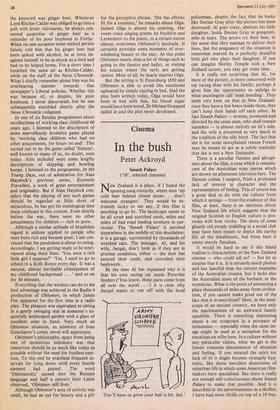Cinema
In the bush
Peter Ackroyd
Smash Palace
(' 18' , selected cinemas) New Zealand is a place, if I heard the opening song correctly, where men 'sip cold beer behind closed doors . . . don't welcome strangers'. They would be ex- tremely lucky to see any, if this film is anything to go by. The landscape seems to be all scrub and scorched earth, miles and miles of bad road leading nowhere in par- ticular. The 'Smash Palace' is perched somewhere in the middle of this desolation; it is a garage, surrounded by thousands of wrecked cars. The manager, Al, and his wife, Jacqui, don't look as if they are in pristine condition, either — the dust has entered their souls, and corroded their bodywork.
By the time Al has explained why it is that his own racing car needs Peruvian fenders ("Lou know, these parts come from all over the world . .') it is clear why Jacqui wants to run off with the local
' You'll have to grow your hair a bit, lad.' policeman, despite the fact that he looks like Dorian Gray after the picture has been destroyed. Al goes crazy, abducts his little daughter, holds Dorian Gray at gunpoint, wife in tears. The actors try their best, in the sense that they manage to deliver their lines, but the poignancy of the situation is somewhat marred by a perfectly dreadful little girl who plays their daughter. If you can imagine Shirley Temple with a New Zealand accent, you may get some idea.
It is really not surprising that Al, for most of the picture, is more concerned with car racing than with his family; perhaps it gives him the opportunity to indulge in what sociologists call 'male bonding', They seem very keen on that in New Zealand: once they have a few beers inside them, they can't keep their hands off each other. In fact Smash Palace — written, produced and directed by the same man, who shall remain nameless — is almost entirely on Al's side, and the wife is presented as very much in the tradition of the silly bitch. The fact that she is for some unexplained reason French may be meant to act as a subtle reminder that she is not a New Zealander.
There is a peculiar flatness and abrupt- ness about the film, a tone which is reminis- cent of the Australian soap operas which are shown on afternoon television here. The flatness comes, I suspect, from a profound lack of interest in character and the representation of feeling. This of course has a great deal to do with the culture from which it springs — from the evidence of this film, at least, there is an inertness about New Zealand life which suggests that the original Scottish or English culture is pro- strate with heat stroke. The shots of some ghastly old people yodelling in a social club may have been meant to depict the earthy life of the inhabitants, but from here it seems merely flatulent.
It would be hard to say if this bland realism is characteristic of the New Zealand cinema — who could tell us? — but let us assume that it is. It is certainly much plainer and less fanciful than the current examples of the Australian cinema, but it lacks also the Australian sense of the barbaric or the numinous. What is the point of presenting a place thousands of miles away from civilisa- tion, if you cannot make good use of the fact that it is uncivilised? Here, in the land- scape of an ancient country, we have only the machinations of an awkward family squabble. There is something depressing about a car scrapyard in a prospect of mountains — especially when the same im- age might be used as a metaphor for the emotions on offer here. In a culture without any particular values, what we get is the lowest common denominator of situation and feeling. If you entered the spirit (or lack of it) it might become strangely hyp- notic, like those merciless dissections of suburban life in which some American film- makers have specialised. But there is really not enough self-consciousness about Smash Palace to make that possible. And it is described in the advertisements as a thriller; I have had more thrills on top of a 19 bus.






































 Previous page
Previous page